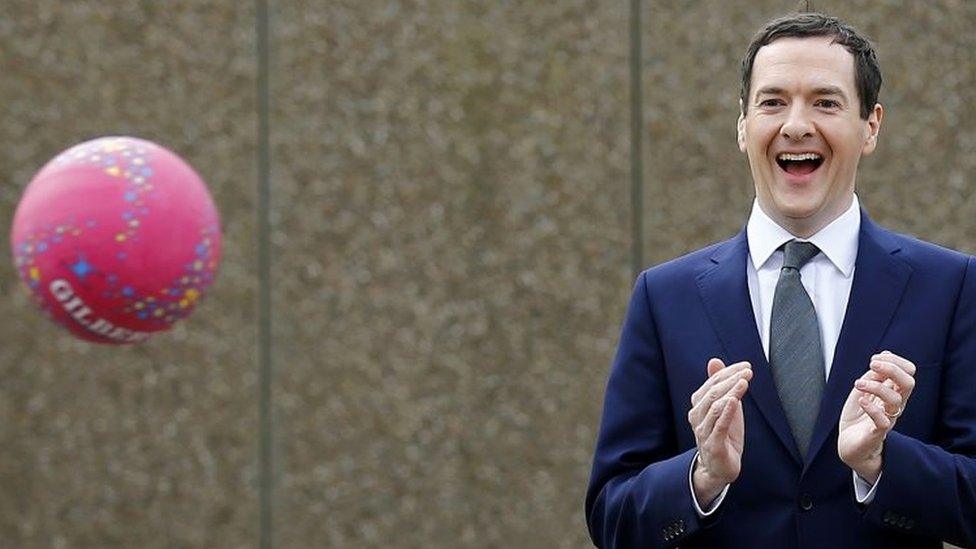A Budget conspiracy?
- Published

George Osborne on a post-Budget visit to a school in Leeds
From time to time, you know I like to pass on some of the conspiracy theories that do the rounds in Westminster.
If that's not your bag, then please don't proceed any further, I won't take it personally.
Of course today, most people in SW1 are firmly in the Budget day two phase, quite rightly poring over the detail as think tanks and independent number crunchers get their hands on it, and in this case, as Tory backbenchers' tempers rise over some of the proposals.
But one question that remains unanswered is why did the chancellor decide to undertake what's been described as the biggest ever reduction in borrowing right at the end of the Parliament to magically meet his political target?
Maybe you need a conspiracy theory to answer that.
And this time, the theories centre around George Osborne's ambitions to move into Number 10.
One minister told me, this is all about "next generation George", by pushing cuts and consolidation to the last possible moment in the Parliament.
He would therefore be trying to secure the top job when people are feeling more flush due to income tax cuts and the pain from last minute austerity hasn't yet been felt. This is "fixing the leadership when the sun is shining", they suggested.
But another source suggests something even more devilish.
'Champing at the bit'
It's pointless, they suggest, being bemused by the seemingly strange timing of it all.
Traditionally governments are tough on spending when they are fresh from election victory, then softer towards the end.
This time, it's the other way round.
No need for confusion though, this conspiracy implies. The simple reason is that this Parliament is never going to make it to the end of its fixed term in 2020. And that means the cuts, that pain in 2020, is simply never going to happen because there will be a general election long before. And, a different man or woman with their hands on the Red Box.
Yes, I know there is a law that makes it hard for the government to get out of the 2020 timeline - the Fixed Term Parliament Act was written under the coalition to protect its stability. But it is not at all impossible.
An early election could be called if two thirds of MPs agreed. Or if a vote of no confidence in the government was passed by the House of Commons, with no alternative being able to command the confidence of MPs within fourteen days.
Some in Westminster's giant gossip chamber believe the Tory leadership is "champing at the bit" to take that chance.
Big cuts
The theoretical prize is an early election after the Tories have settled their leadership succession, before Labour's unhappy MPs have had the chutzpah to sort out theirs.
The argument goes, George Osborne newly installed in Number 10, doesn't have to make the big cuts, dissolves Parliament, goes to the country and beats Jeremy Corbyn's Labour to a pulp.
Try raising any of this on the record with any politician? You don't get very far.
Try raising it off the record, you don't get that far either.
But there are people who believe this conspiracy could well be the Tory leadership's dream.
There are plenty of people of course on all sides of the House of Commons who would be determined to stop them.
And conspiracies normally of course remain just that, theories that the political anoraks enjoy mulling over.
But who knows, very occasionally they can turn out to be true.
We'll have to wait rather a long time to see if this one does.